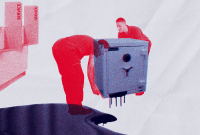Support strong Canadian climate journalism for 2025
The federal government has found a powerful supporter for its decision to allow a natural gas pipeline between Russia and Europe to resume operations.
The U.S. State Department says it backs Canada's decision to send repaired turbine equipment vital to the Nord Stream 1 pipeline back to Germany.
Spokesman Ned Price says it's the right decision because it will allow Europe to fortify its gas reserves in the short term.
Price says that will, in turn, help Germany and others increase their energy security in the name of ultimately countering Russia's energy dominance in the region.
Ottawa's decision has been roundly criticized by Ukraine, which calls it a "dangerous" exception to Canada's sanctions against Russia.
Natural Resources Minister Jonathan Wilkinson says the decision was necessary to ensure Europe has immediate access to reliable, affordable energy.
In prepared remarks at the St. John’s Board of Trade on Monday, Wilkinson said the energy security implications of volatility in the European market could be devastating.
"This is not just a matter of inconvenience, or even a crunch with respect to affordability and pocketbooks," he said. "This is a fundamental threat to their ability to provide the basics for their citizens, from heat for their homes, to fuel to transport food and goods and power to sustain their industries, their jobs and their economies."
"In the short term, the turbine will allow Germany and other European countries to replenish their gas reserves, increasing their energy security and resiliency and countering Russia's efforts to weaponize energy," Price said in a statement.
"We are grateful for the partnership with Canada and Germany and their solidarity in defence of Ukraine in the wake of Russia's unprovoked and unjustifiable war against its sovereign neighbour and the significant sanctions they have each put in place to hold the Kremlin accountable."
Wilkinson announced Saturday that the turbines, which had been sent to Montreal for scheduled repairs by Siemens Canada, would be returned.
Back in June, Siemens said Canada's sanctions against Russia over its invasion of Ukraine meant the company couldn't return the turbines.
In a statement Sunday, Ukraine's Foreign Affairs Ministry and Energy Ministry expressed "deep disappointment" in Canada's decision.
In his nightly video address Monday, Ukrainian President Volodymyr Zelenskyy predicted Russia would act again to cut off its supply of natural gas to Europe “at the most acute moment.”
“This is what we need to prepare for now, this is what is being provoked now,” Zelenskyy said.
He added that Canada’s decision to allow shipment of the repaired gas turbine would set a dangerous precedent that Russia will exploit “because every concession in such conditions is perceived by the Russian leadership as an incentive for further, stronger pressure.”
Germany had feared Russia would shut off deliveries of natural gas to Europe after the planned maintenance, having already slowed the flow of energy — something Gazprom, Russia's state-owned energy giant, attributed to the needed repairs.
Ukraine isn't buying it, describing Russia's threats as little more than "blackmail that has no technical justification."
"Russia is able to continue to supply gas to Germany in full without this turbine," it said.
Germany, which is Europe's largest economy, warned last month it was in a crisis over Russia's decision to cut the amount of gas flowing through the Nord Stream 1 pipeline by 60 per cent.
The same day Wilkinson announced the turbines would be returned, Foreign Affairs Minister Mélanie Joly announced Canada planned to apply a new set of sanctions targeting Russia's land and pipeline transportation and manufacturing sectors.
This report by The Canadian Press was first published July 11, 2022.
— With files from The Associated Press




Comments